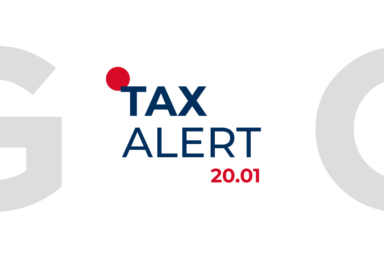Legal Hotline | Digest of the main legislative changes in Ukraine 12.11.2020
Tags
Contents
Deferral of taxation on controlled foreign companies has been proposed
On November 3, 2020, the Verkhovna Rada of Ukraine adopted as a basis the Draft Law No. 4065 “On amendments to the Tax Code of Ukraine and other laws of Ukraine on ensuring data collection and information necessary for the declaration of individual taxable items” (hereinafter referred to as the “Draft Law“).
The Draft Law envisages the salient provisions as such:
- Taxation and reporting rules for controlled foreign companies will come into force from 2022;
- The circumstances under which controlled transactions without a principal purpose are specified (“Principal Purpose Test”);
- The types of financial outcome adjustments for controlled and uncontrolled transactions with non-residents are determined;
- Taxation and accounting procedures will be applied to non-residents through their permanent representative offices under the new rules starting from January 01, 2021;
- The rules on the peculiarities of the tax treatment of interest on loans received from non-residents (“Thin Capitalization Rules”) are clarified.
Hence, the Draft Law will clarify some important provisions of the Law of Ukraine No. 466-IX, which initiated tax reform, in particular, the taxation of controlled foreign companies. The Draft Law is being finalized by the Parliament for its second reading within a reduced time frame.
New remote working arrangements have been proposed
On November 3, 2020, the Verkhovna Rada of Ukraine adopted as a basis the Draft Law No. 4051 “On amendments to certain legislative acts on the improvement of legal regulation of remote work” (hereinafter referred to as the “Draft Law“).
This Draft Law proposes a distinction between flexible working hours, home-based work and remote work arrangements.
With regard to flexible working hours, the Draft Law proposes:
- to enable an employee to independently regulate the beginning, end and duration of working time during the day upon agreement with an employer;
- to enable an employee to establish a new work schedule at his/her request without a prior two-month notice;
- to allow an employer to establish a new work schedule at his/her/its decision with prior two-month notice to the employee;
- to oblige an employer to ensure that time worked is accurately recorded and monitored for its productive use;
- to enable an employer, provided any flexible regime rules are breached, to transfer an employee back to the general regime of work without prior notice.
The following innovations are proposed in the Draft Law for home-based work:
- To introduce a standard form of employment contract for home-based work;
- To oblige an employee to record his/her work space, which may not be changed at the employee’s initiative unless agreed with the employer;
- To allow an employee to change his/her work space by reason beyond his/her control, giving the employer a three working days’ notice;
- To require employers to keep records of all employees, women and men separately, as well as records of the work tasks assigned to the employee, indicating the conditions of remuneration.
The following innovations are proposed in the Draft Law for remote work:
- To introduce a standard form of employment contract for remote work;
- if agreed between the employee and the employer, remote work may be combined with work on the employer’s premises;
- The employee must be guaranteed a free period of rest (the period of disconnection) during which the employee may interrupt any communication with the employer;
- To stipulate the conditions under which an employee may require the employer to work remotely.
The Draft Law is being prepared by the Parliament for its second reading.
Procedure for notifying non-residents of their registration with the tax authorities has been approved
On November 4, 2020, the Cabinet of Ministers of Ukraine approved the procedure for notifying non-residents of their registration as taxpayers (hereinafter referred to as the “Procedure“).
The procedure provides for a mechanism whereby the regulatory authorities notify the non-resident on their registration as taxpayers, in particular:
- Conditions under which non-residents are directly notified of their registration under the prescribed form;
- Circumstances in which a notification will be sent to a separate non-resident unit by e-mail, mail or in person;
- If notification cannot be delivered to a separate unit of the non-resident, in particular, because of its refusal to accept the notification, it will be sent directly to the non-resident;
- In case the regulatory authority has not been able to locate the non-resident or the notification mailed by post has not been delivered to the non-resident, the Draft Law prescribes the competence of the State Tax Service of Ukraine to apply to the competent authority of the state of the non-resident which will serve the notification.
The procedure has been adopted pursuant to the provisions of Law No. 466 as of January 16, 2020, on the obligation of non-residents to operate in Ukraine through separate units, including permanent representative offices, or acquire immovable property or receive property rights to such property in Ukraine, or open accounts in banks of Ukraine to be registered with the regulatory authorities.
Sign up to be aware
New achievements are inspired by information. GO further, don’t miss out GOLAW news and legal alerts
Our expertise
-
- Antitrust and Competition
- Banking and Finance
- Compliance, Corporate Governance and Risk Management
- Corporate and M&A
- Criminal and White Collar Defence
- Defense in Anti-corruption procedures and regulations
- Labor and Employment
- Natural Resources and Environment
- Government Relations (GR)
- Insolvency and Corporate Recovery
- Intellectual property
- International trade
- Legal support of business and private Сlients in Germany
- Litigation and dispute resolution
- Private clients
- Real Estate and Construction
- Energy and Natural Resources
- Restructuring, Claims and Recoveries
- Martial Law
- Tax and Customs
-
- Agribusiness
- Aviation
- Chemical industry
- Engineering, Construction and Building Materials
- Natural Resources and Environment
- Financial institutions
- IT and AI
- Industry and manufacturing
- Healthcare industries, Life sciences and Pharmaceuticals
- Media, Entertainment, Sports and Gambling
- Retail, FMCG and E-Commerce
- Transport and Logistics
We use cookies to improve performance of our website and your user experience.
Cookies policy
Cookies settings







